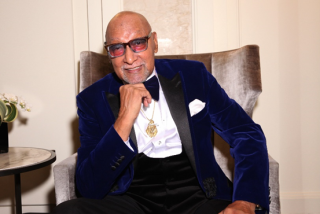Irving Mills, Discoverer of Duke Ellington, Dies
- Share via
Irving Mills, a lyricist, music publisher and former talent manager best known for having discovered jazz great Duke Ellington, died Sunday in Palm Springs after a short illness. He was 91.
A man who began his career before the days of radio as a “song demonstrator,” singing songs behind music counters of five-and-dime stores, Mills became the publisher of Ellington’s most famous songs, including “Mood Indigo,” “Solitude,” and “Sophisticated Lady.”
As his manager during the 1930s, he broke Ellington into what was a closed world of “white music,” arranging theater dates and other engagements at places long assumed to be all-white preserves.
He developed the Duke Ellington Band, Cab Calloway and his Orchestra, and was instrumental in the career of composer Hoagy Carmichael. When he organized the Irving Mills and his Hotsy Totsy Gang in the 1920s, among the musicians he used as sidemen on various recordings were Benny Goodman, Tommy Dorsey, Jimmy Dorsey, Glenn Miller and Artie Shaw.
In a career that spanned over 50 years, his path also crossed those of others outside the music business. Columnist Walter Winchell, as a young man, worked for Irving Mill’s music publishing company as a publicity man.
Born Jan. 16, 1894 in New York City, he began his career in 1913 as a song plugger. “I sang at Woolworth’s, Grant’s--all of ‘em,” he recalled later.
Possessed of an entrepreneurial spirit, he started Mills Music with his brother, Jack, in 1919, to publish music. Soon he was producing records as well, traveling the country to scout talent in an endless number of dance halls, cafes, and nightspots.
The collaboration that was to launch his reputation--with Ellington--started in New York in 1926, when he dropped in at a club on 49th and Broadway where Duke Ellington and his Washingtonians were playing.
Fortuitous Timing
The timing of this first encounter was fortuitous, Mills later recalled. He had set up Fletcher Henderson, a composer, to play piano and lead the band for singer Alberta Hunter and other singers.
“I wanted to build the best black recording band around Fletcher, but he was unreliable,” Mills said. “He’d hire different men for each session, or he’d show up late, or the arrangement wouldn’t be ready. There was so much trouble that I started looking for someone more dependable.”
Shortly after he hired Ellington to replace Fletcher, he was able to arrange air time on radio for the band--”radio was still the big new thing in 1927”--he later said. It was no easy feat because at the time it was still unusual for a black band to broadcast regularly.
Mills handled Ellington until 1939, by which time he had a large stable of artists to manage, at one point including Milton Berle.
As years went on, he became known as much as a talent manager and impresario as a music publisher, but the latter was his favorite. After he sold Mills Music in 1965, he continued to publish music and never totally retired.
His wife, Bessie, to whom he was married for 65 years, died in 1976. He is survived by four sons and one daughter, 56 grandchildren and great-grandchildren.
Funeral services will be Thursday at 11 a.m. at Mount Sinai Mortuary in Los Angeles.
More to Read
The biggest entertainment stories
Get our big stories about Hollywood, film, television, music, arts, culture and more right in your inbox as soon as they publish.
You may occasionally receive promotional content from the Los Angeles Times.










